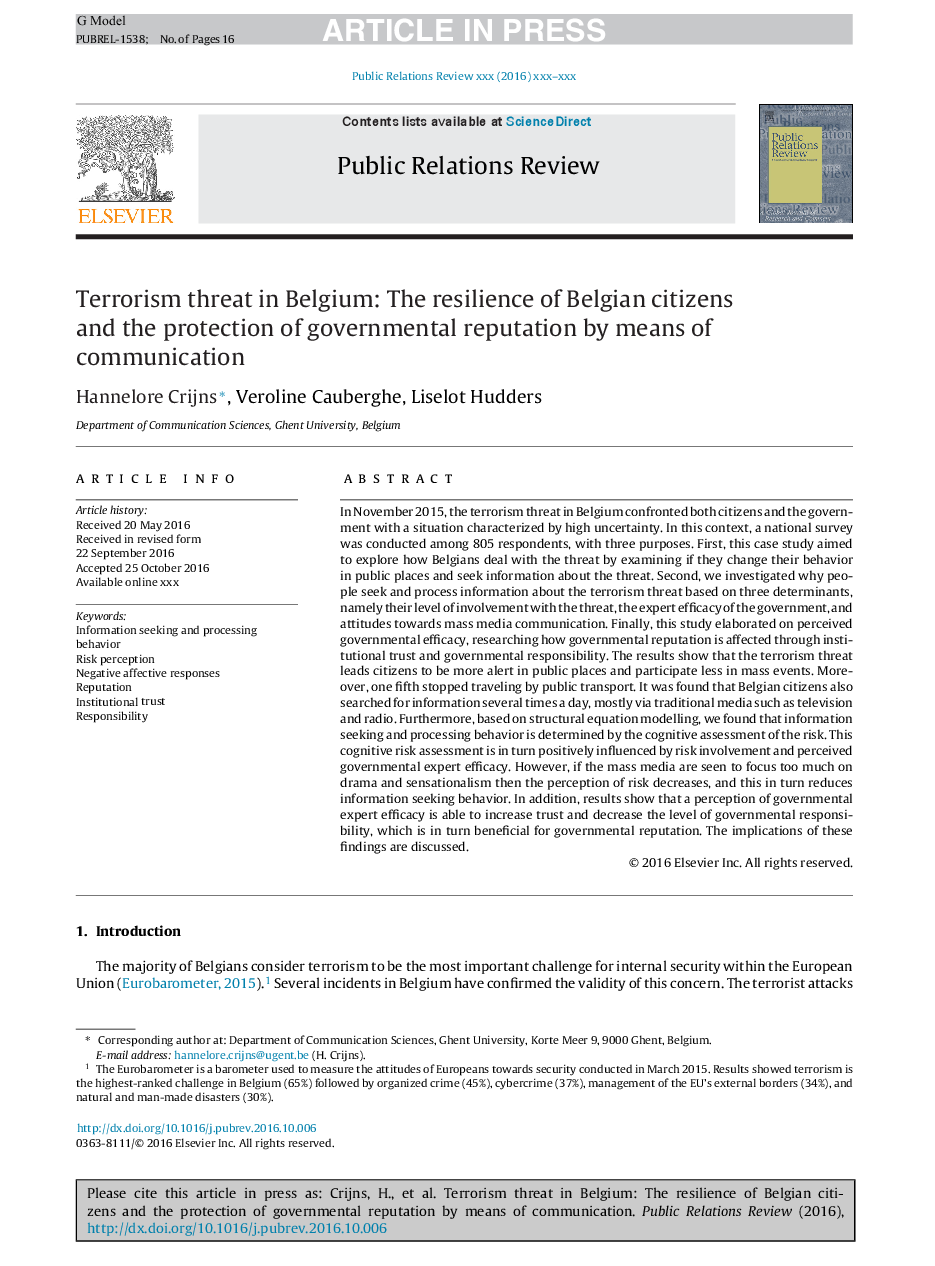ترجمه فارسی عنوان مقاله
تهدید تروریسم در بلژیک: انعطاف پذیری شهروندان بلژیکی و حمایت از شهرت دولت از طریق ارتباطات
عنوان انگلیسی
Terrorism threat in Belgium: The resilience of Belgian citizens and the protection of governmental reputation by means of communication
| کد مقاله | سال انتشار | تعداد صفحات مقاله انگلیسی |
|---|---|---|
| 160041 | 2017 | 16 صفحه PDF |
منبع

Publisher : Elsevier - Science Direct (الزویر - ساینس دایرکت)
Journal : Public Relations Review, Volume 43, Issue 1, March 2017, Pages 219-234
ترجمه کلمات کلیدی
رفتار اطلاعاتی و پردازش، درک ریسک، پاسخ های عاطفی منفی، شهرت، اعتماد سازمانی، مسئولیت،
کلمات کلیدی انگلیسی
Information seeking and processing behavior; Risk perception; Negative affective responses; Reputation; Institutional trust; Responsibility;
ترجمه چکیده
در نوامبر سال 2015، تهدید تروریسم در بلژیک با هر دو شهروند و دولت مواجه شد که شرایطی با عدم اطمینان بالا داشت. در این زمینه، یک نظرسنجی ملی بین 805 پاسخ دهنده با سه هدف انجام شد. اول، این مطالعه موردی با هدف بررسی چگونگی برخورد بلژیک با تهدید از طریق بررسی رفتار رفتاری آنها در مکان های عمومی و جستجوی اطلاعات در مورد تهدید است. دوم اینکه ما تحقیق کردیم که چرا مردم اطلاعات مربوط به تهدید تروریسم را بر اساس سه عامل تعیین کننده، یعنی سطح درگیری با تهدید، کارآمدی متخصص دولت و نگرش نسبت به ارتباطات رسانه های جمعی، بررسی و پردازش می کنند. در نهایت، این مطالعه در مورد اثربخشی ادراک شده دولتی توضیح داد، تحقیق در مورد اینکه چگونه اعتبار دولت از طریق اعتماد سازمانی و مسئولیت دولتی تحت تاثیر قرار می گیرد. نتایج نشان می دهد که تهدید تروریسم باعث می شود شهروندان بیشتر در مکان های عمومی هشدار دهند و در رویدادهای جمعی کمتر شرکت کنند. علاوه بر این، یک پنجم مسافرت های عمومی را متوقف کرد. مشخص شد که شهروندان بلژیکی چندین بار در روز اطلاعات را نیز جستجو می کنند، عمدتا از طریق رسانه های سنتی مانند تلویزیون و رادیو. علاوه بر این، براساس مدلسازی معادلات ساختاری، ما دریافتیم که رفتار جستجوی اطلاعات و پردازش توسط ارزیابی شناختی از خطر تعیین می شود. این ارزیابی ریسک شناختی به نوبه خود به طور مثبت تحت تاثیر قرار گرفتن در معرض خطر و کارآیی متخصص دولتی قرار گرفته است. با این حال، اگر رسانه های جمعی بیش از حد روی درام و حساسیت تمرکز می کنند، درک مخاطرات کاهش می یابد و این به نوبه خود رفتارهای اطلاعاتی را کاهش می دهد. علاوه بر این، نتایج نشان می دهد که ادراک از کارآمدی کارشناسان دولتی قادر به افزایش اعتماد و کاهش سطح مسئولیت های دولتی است که به نوبه خود برای شهرت دولت مفید است. نتایج این یافته ها مورد بحث قرار گرفت.

